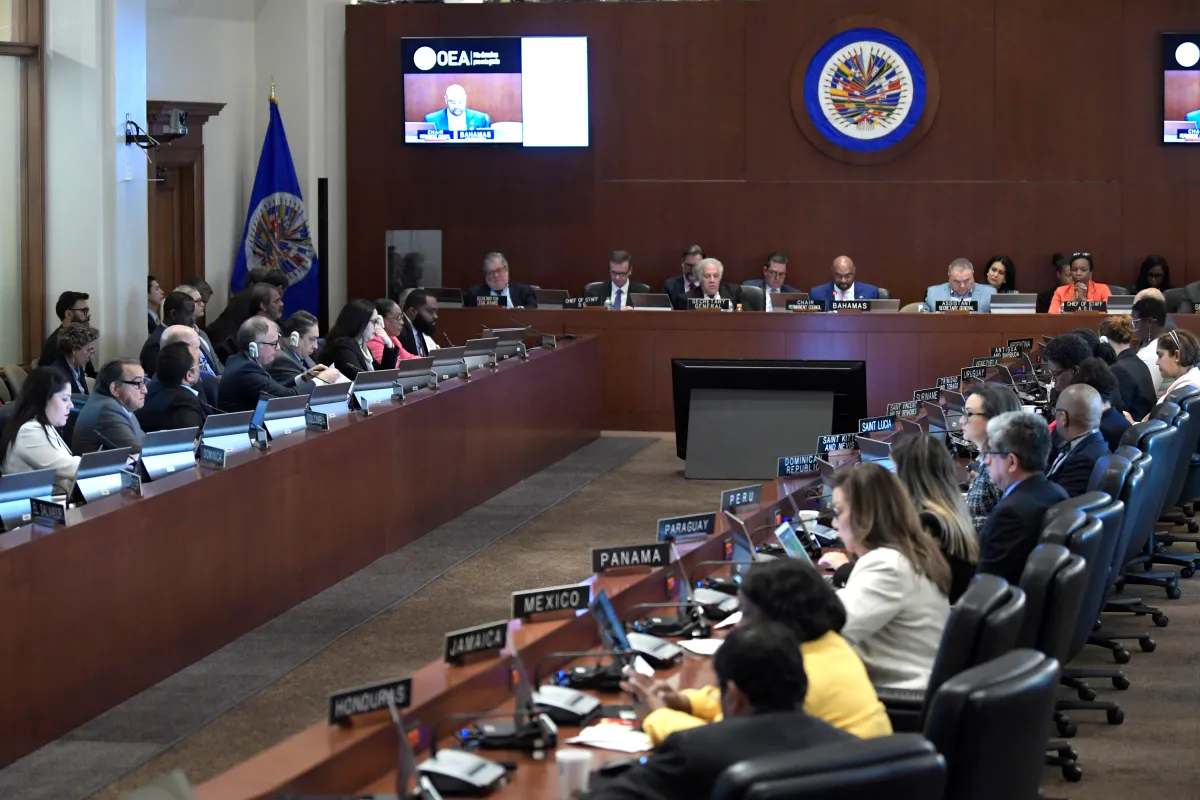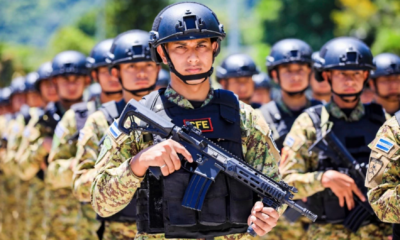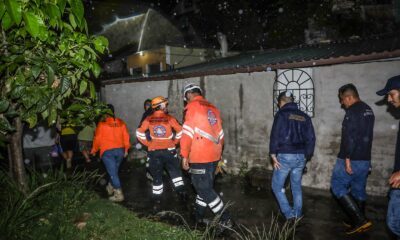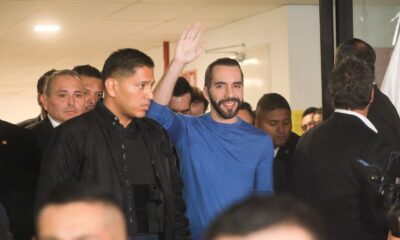International
The OAS wraps Mexico with a resolution that “condemns strongly” the assault on Ecuador

The Organization of American States (OAS) wrapped Mexico on Wednesday and approved a resolution that “energically” condemns the incursion of the Ecuadorian Police into the Mexican embassy in Quito last Friday.
The resolution, presented to the Permanent Council of the OAS by the delegation of Colombia, was approved with the favorable vote of the vast majority of countries and the only vote against Ecuador.
The delegation of Mexico did not appear in session, while El Salvador abstained in the vote.
The resolution resolves to “vehemently condemn the intrusion into the facilities of the Mexican Embassy in Ecuador and the acts of violence exercised against the integrity and dignity of the diplomatic personnel of the mission.”
The document reaffirms “the obligation of all States to ensure respect for the privileges and immunities of diplomatic missions” and calls for respect for the Vienna Convention on Diplomatic Relations, which establishes that embassies are inviolable.
The events occurred last Friday night, when, by order of the Ecuadorian president, Daniel Noboa, the country’s police broke into the Mexican embassy to arrest Jorge Glas, former vice president of Rafael Correa prosecuted for corruption and who had requested political asylum from Mexico.
The images of the security cameras, which were projected during the OAS session, show how the police pointed weapons and subdued Roberto Canseco, in charge of the diplomatic mission, to the ground while they took Glas.
After that episode, Mexican President Andrés Manuel López Obrador broke diplomatic relations with Ecuador, which justifies his actions by accusing Mexico of having violated international asylum treaties by sheltering a person prosecuted for corruption.
The resolution adopted in the OAS also reaffirms “the obligation” that States have to “respect in their entirety” the provisions of the 1954 Diplomatic Asylum Convention and recalls that diplomats are obliged “not to interfere in the internal affairs” of the receiving State.
Likewise, the document urges Ecuador and Mexico to “initiate a dialogue and take immediate action to resolve this serious issue constructively.”
This Wednesday’s session, convened at the request of Colombia and Bolivia, two allied governments of Mexico, is the second of this week after Tuesday’s, which Ecuador convened to justify its actions.
The Minister of Foreign Affairs of Ecuador, Gabriela Sommerfeld, described this Wednesday as “fair” the OAS resolution, which recalled the obligation of States to respect the Diplomatic Asylum Convention of 1954.
“It is a fair resolution, where you can see the non-compliance with the use of diplomatic headquarters as well, so let’s go ahead like Ecuador, we are also going to enforce our version of the facts,” he said.
He added that these are international forums “which are made so that, in a balanced way, through dialogue, in a respectful way, all parties are listened to and resolutions are taken.”
Asked about whether Ecuador is willing to engage in a dialogue with Mexico, the minister reiterated that her country “is always open to strengthening relations with absolutely all countries.”
And, when asked if the country is willing to apologize to Mexico, the head of diplomacy said: “That is not at the discussion table at this moment.”
International
U.S. Senate Rejects Budget, Bringing Government Closer to Shutdown Amid DHS Dispute

The U.S. Senate voted on Thursday against a budget proposal in a move aimed at pressuring changes at the Department of Homeland Security (DHS), following the killing of two civilians during a deployment of immigration agents in Minneapolis.
All Senate Democrats and seven Republican lawmakers voted against the bill, which requires 60 votes to advance, pushing the country closer to a partial government shutdown that would cut funding for several agencies, including the Pentagon and the Department of Health.
The rejection came as Senate leaders and the White House continue negotiations on a separate funding package for DHS that would allow reforms to the agency. Proposed measures include banning Immigration and Customs Enforcement (ICE) agents from wearing face coverings and requiring them to use body-worn cameras during operations.
The vote took place just hours after President Donald Trump said he was “close” to reaching an agreement with Democrats and did not believe the federal government would face another shutdown, following last year’s record stoppage.
“I don’t think the Democrats want a shutdown either, so we’ll work in a bipartisan way to avoid it. Hopefully, there will be no government shutdown. We’re working on that right now,” Trump said during a Cabinet meeting at the White House.
International
Trump Says Putin Agreed to One-Week Halt in Attacks on Ukraine Amid Extreme Cold

U.S. President Donald Trump said on Thursday that he secured a commitment from Russian President Vladimir Putinto halt attacks against Ukraine for one week, citing extreme weather conditions affecting the region.
“Because of the extreme cold (…) I personally asked Putin not to attack Kyiv or other cities and towns for a week. And he agreed. He was very pleasant,” Trump said during a Cabinet meeting broadcast by the White House.
Trump acknowledged that several advisers had questioned the decision to make the call.
“A lot of people told me not to waste the call because they wouldn’t agree. And he accepted. And we’re very happy they did, because they don’t need missiles hitting their towns and cities,” the president said.
According to Trump, Ukrainian authorities reacted with surprise to the announcement but welcomed the possibility of a temporary ceasefire.
“It’s extraordinarily cold, record cold (…) They say they’ve never experienced cold like this,” he added.
Ukrainian President Volodymyr Zelensky later commented on the announcement, expressing hope that the agreement would be honored.
International
Storm Kristin Kills Five in Portugal, Leaves Nearly 500,000 Without Power

Storm Kristin, which battered Portugal with heavy rain and strong winds early Wednesday, has left at least five people dead, while nearly half a million residents remained without electricity as of Thursday, according to updated figures from authorities.
The revised death toll was confirmed to AFP by a spokesperson for the National Emergency and Civil Protection Authority (ANPEC). On Wednesday, the agency had reported four fatalities.
Meanwhile, E-Redes, the country’s electricity distribution network operator, said that around 450,000 customers were still without power, particularly in central Portugal.
Emergency services responded to approximately 1,500 incidents between midnight and 8:00 a.m. local time on Wednesday, as the storm caused widespread disruptions.
The Portuguese government described Kristin as an “extreme weather event” that inflicted significant damage across several regions of the country. At the height of the storm, as many as 850,000 households and institutions lost electricity during the early hours of Wednesday.
Several municipalities ordered the closure of schools, many of which remained shut on Thursday due to ongoing adverse conditions.
Ricardo Costa, regional deputy commander of the Leiria Fire Brigade, said residents continue to seek assistance as rainfall persists.
“Even though the rain is not extremely intense, it is causing extensive damage to homes,” he noted.
In Figueira da Foz, a coastal city in central Portugal, strong winds toppled a giant Ferris wheel, underscoring the severity of the storm.
-

 Central America3 days ago
Central America3 days agoGuatemala seizes over a ton of cocaine hidden in flour at Pacific port
-

 International5 days ago
International5 days agoDelcy Rodríguez seeks political agreements after Maduro’s ouster
-

 International3 days ago
International3 days agoHistoric snowstorm paralyzes Toronto after 60 centimeters of snow
-

 Central America2 days ago
Central America2 days agoGuatemala Police Arrest Prison Guard Caught in the Act of Extortion
-

 International3 days ago
International3 days agoSpain’s irregular migrant population rises to 840,000, study finds
-

 Central America2 days ago
Central America2 days agoBukele leads public trust rankings as UCA survey highlights gains in security
-

 Central America2 days ago
Central America2 days agoHonduras swears in conservative president Asfura after disputed election
-

 International5 days ago
International5 days agoFederal immigration agents kill man in Minneapolis, sparking protests and outrage
-

 International1 day ago
International1 day agoFootball Fan Killed in Clashes After Colombian League Match
-

 International2 days ago
International2 days agoWinter Storm Fern Leaves 30 Dead and Over One Million Without Power Across the U.S.
-

 Central America1 day ago
Central America1 day agoGuatemala President Says Starlink Terminal Found Inside Prison
-

 Sin categoría2 days ago
Sin categoría2 days agoEight Killed in Series of Armed Attacks in Ecuador’s Manabí Province
-

 International2 days ago
International2 days agoDoomsday clock moves to 85 seconds before midnight amid rising global risks
-

 International3 days ago
International3 days agoRights group says nearly 6,000 killed in Iran protest crackdown
-

 International1 day ago
International1 day agoMissing Spanish Sailor Rescued After 11 Days Adrift in Mediterranean
-

 International1 day ago
International1 day agoRubio Says U.S. Could Participate in Follow-Up Russia-Ukraine Talks
-

 International2 days ago
International2 days agoSpain approves plan to regularize up to 500,000 migrants in Historic Shift
-

 Sin categoría2 days ago
Sin categoría2 days agoEl Salvador Launches Fourth Year of Ocean Mission to Protect Marine Ecosystems
-

 International3 days ago
International3 days agoVenezuela frees at least 80 political prisoners, NGO says
-

 International3 days ago
International3 days agoEU launches new probe into X over AI-generated fake nude images
-

 International3 days ago
International3 days agoFrance debates ban on social media for children under 15
-

 International6 hours ago
International6 hours agoU.S. Senate Rejects Budget, Bringing Government Closer to Shutdown Amid DHS Dispute
-

 International3 days ago
International3 days agoSevere winter storm grips U.S., leaves multiple dead as extreme cold persists
-

 International6 hours ago
International6 hours agoStorm Kristin Kills Five in Portugal, Leaves Nearly 500,000 Without Power
-

 International6 hours ago
International6 hours agoTrump Says Putin Agreed to One-Week Halt in Attacks on Ukraine Amid Extreme Cold
-

 International6 hours ago
International6 hours agoMan Arrested After Vehicle Crashes Into Jewish Institution in Brooklyn






































































































